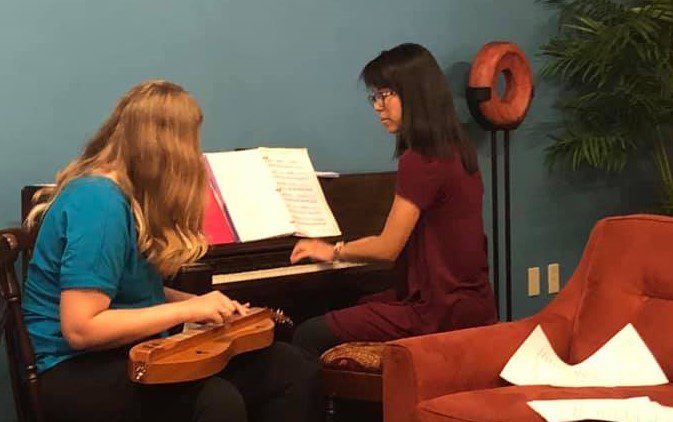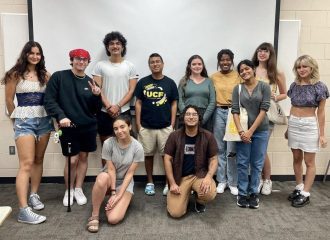By Seva Reilly
When I say, “Go Knights!”
You say, “Charge on!”
I ask a follow up question: “And where are you charging to?”
Your answers are indistinguishable, because they are varied. Seniors are charging forwarding into graduation and future jobs; others are charging on to internships or study abroad experiences. Still others are charging forward with graduate, medical, or another professional school in mind.
But for students who aren’t at that point yet, students who can only manage to focus on assignment after assignment after assignment, it can feel like you’re going nowhere. During the COVID-19 pandemic, I’ve often felt that I am not a Charging Knight, but rather a knight wandering through a fog of homework and classes. While I prize the opportunity to earn an education, I’ve also experienced the monotony of study life (especially during quarantine).
For me, that’s where volunteering comes in.
Volunteering helps me break out of my ruts and gets me involved. Volunteering is far more than the number of hours on your transcript – it’s an opportunity for you to meet other volunteers and members of the community, develop your skills, and discover new interests, all while advancing your cause of choice. It’s an invaluable experience that I think everyone should take advantage of!
There are several pathways to start volunteering. Many of them overlap, but, generally speaking, you’ll find a diversity of experiences when you use a variety of routes to search for opportunities.
1. Ask Someone You Know
Like most Florida high schoolers, I needed 100 hours to qualify for the Bright Futures scholarship. As a busy student, I wasn’t able to make a separate outing to volunteer, so I asked teachers at my school if they could use a teacher’s assistant. I was able to volunteer in a middle school English class and in elementary arts and reading classes, experiences that inspired me to pursue a major in communication sciences and disorders. You never know what opportunities your classmates, friends, professors, and family members might know about, or what experiences they’ll be able to provide you with!
2. Browse Your Options
As I started my freshman year, I knew I wanted to find a way to volunteer at UCF. After searching through the online Knight Connect database of Registered Student Organizations (RSOs), I learned that there are more UCF groups than I could have imagined. I also attended Opening Knight, one of the events hosted by UCF Knights of the Round Table to promote campus organizations. At the event, I spoke with a variety of organizations in person, such as Aphasia Family UCF, Volunteer UCF, and Knights Hunger Coalition. (All of these organizations I either volunteered with previously or continue to volunteer with now!)
A less formal way to browse is to check out the various UCF organizations on social media. One networking strategy is to look at volunteer organization accounts and see what accounts they follow (for instance, organizations like Volunteer UCF follow related groups at/near UCF). During quarantine, I used social media to learn about organizations offering virtual volunteer opportunities (like Volunteer UCF) and to write a “To Volunteer” list of groups I want to join in the future.
Once you start looking, you’re bound to find something on campus that interests you!
3. Start with Your Hobbies and Talents
This is a good strategy when you know what you want to do, but you don’t know what organization offers this opportunity.
Personally, I knew I wanted to volunteer to share my music with others. During my first semester at UCF, I joined the Latino Medical Student Association Plus to complete arts and crafts with residents at an assisted living facility. Although I do not aspire to attend medical school, nor identify as Latino, I greatly enjoyed meeting members of the group and playing the piano at the assisted living facility. I’ve played the piano for years, but since I’m not majoring in music, I’ve had few opportunities to play after ending high school piano lessons. Volunteering with LMSA+ was the perfect chance to share my creativity and abilities with others.

4. Start with Your Major
As a Communication Sciences and Disorders major, I joined UCF National Student Speech-Language Hearing Association (NSSLHA) to get involved in the professional organization for my major. Joining NSSLHA has opened up so many opportunities for me – I’ve become friends with so many other communication sciences and disorders students through NSSLHA. Also, NSSLHA hosts educational events and seminars where we get to meet professionals in the field of speech-language pathology. And, of course, NSSLHA offers volunteer events that are related to this field of study. For instance, I’ve gotten to volunteer as a conversation partner at Maitland Presbyterian Church’s Language Learning Center, where I conversed with non-native English speakers.
5. Start with a Topic
If there is a cause or social issue that matters deeply to you, look for ways to get involved in that area. During the beginning of the COVID-19 outbreak last year, I wanted to help those who were most impacted by the quarantine. From the news, I heard about Shopping Angels, a volunteer organization started by a University of Reno student in response to the coronavirus outbreak. Shopping Angels organizes a network of volunteers throughout the country who complete volunteer grocery deliveries for high-risk individuals. I reached out to the Florida branch and have been able to volunteer virtually as a coordinator, arranging the volunteer deliveries for Florida clients.
Food insecurity is a topic close to my heart, so volunteering in this role has been extremely fulfilling and motivating. Many of the Florida volunteers have picked up groceries from food pantries to help clients who are struggling with both food insecurity and greater health risks due to the pandemic.
No matter what your passion is, finding a volunteer opportunity that channels it will yield a deeply meaningful experience for you. Although many of us need volunteer hours to fulfill degree requirements or strengthen resumes, volunteering impacts us in far deeper ways. My volunteer experiences have allowed me grow in empathy, leadership skills, creativity, problem solving, and awareness of critical issues in society. It’s an active and dynamic experience, and there are endless ways for everyone to get involved at UCF, either in-person or virtually. Whether you are a seasoned volunteer or someone looking for a place to start, I hope you choose to invest time in these powerful, life-changing experiences. Through volunteering and serving the community, we as UCF knights can charge on and change the world!





